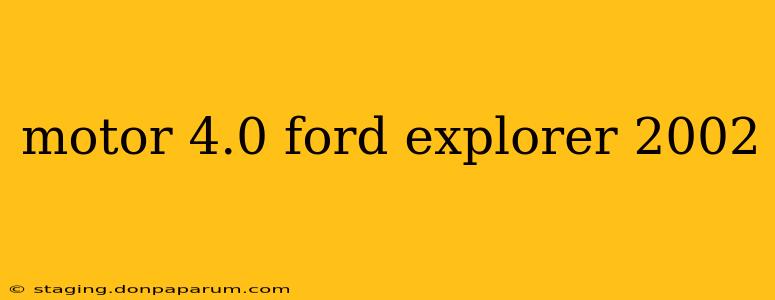The 2002 Ford Explorer, equipped with the ubiquitous 4.0L Cologne V6 engine, represents a significant chapter in Ford's SUV legacy. This guide delves into the intricacies of this powerplant, exploring its strengths, weaknesses, common issues, and maintenance considerations. Understanding your 4.0L engine can significantly impact your ownership experience, leading to smoother operation, fewer repairs, and ultimately, a more enjoyable ride.
Understanding the 4.0L Cologne V6 Engine
The 4.0L Cologne V6, a stalwart of Ford vehicles for many years, is known for its robust construction and relatively simple design. However, like any engine, it has its quirks and potential problem areas. This engine's design, while durable, is also prone to specific issues that are important to be aware of.
Key Features and Specifications:
- Displacement: 4.0 Liters
- Configuration: V6
- Valve Train: Pushrod, OHV (Overhead Valve)
- Fuel System: Typically, multi-port fuel injection (MPFI)
- Known for: Relatively simple design, good torque at lower RPMs
Common Issues and Troubleshooting:
While the 4.0L is generally a reliable engine, several recurring issues plague owners of 2002 Ford Explorers. Proactive maintenance and awareness of these potential problems can prevent costly repairs down the line.
1. Intake Manifold Bolt Failure:
This is perhaps the most notorious problem associated with the 4.0L engine. The bolts that secure the intake manifold can break, leading to vacuum leaks and rough running. Symptoms include a rough idle, loss of power, and a noticeable vacuum leak sound. Prevention involves regular inspection and potentially upgrading to stronger bolts.
2. Exhaust Manifold Cracking:
Cracks in the exhaust manifold are another common occurrence. These cracks can lead to exhaust leaks, reducing performance and potentially damaging the catalytic converter. Symptoms include a loud exhaust leak, decreased engine performance, and a possible "check engine" light.
3. Head Gasket Issues:
While less frequent than the previous two issues, head gasket failure can be catastrophic and expensive to repair. Symptoms can include overheating, white smoke from the exhaust, loss of coolant, and milky oil. Regular coolant level checks are crucial for early detection.
4. Spark Plug Issues:
Accessing the spark plugs can be challenging, but failure to replace them at recommended intervals can result in misfires and poor engine performance. Using the correct spark plug type is essential.
Maintenance Recommendations:
Regular maintenance is paramount for extending the life of your 4.0L engine. Following the manufacturer's recommended maintenance schedule, or even exceeding it, is a wise investment.
Crucial Maintenance Tasks:
- Regular Oil Changes: Using the correct weight and type of oil is vital.
- Coolant Flushes: Prevent overheating and corrosion.
- Spark Plug Replacement: At the recommended intervals.
- Inspection of Intake Manifold Bolts: Check for signs of wear or damage.
- Exhaust System Inspection: Look for cracks or leaks.
Conclusion:
The 2002 Ford Explorer's 4.0L engine, while capable and durable, necessitates vigilant maintenance and awareness of its potential weaknesses. By understanding its common problems and following a proactive maintenance plan, you can maximize its lifespan and enjoy a reliable driving experience. Remember, early detection and preventative measures are key to avoiding costly repairs.

